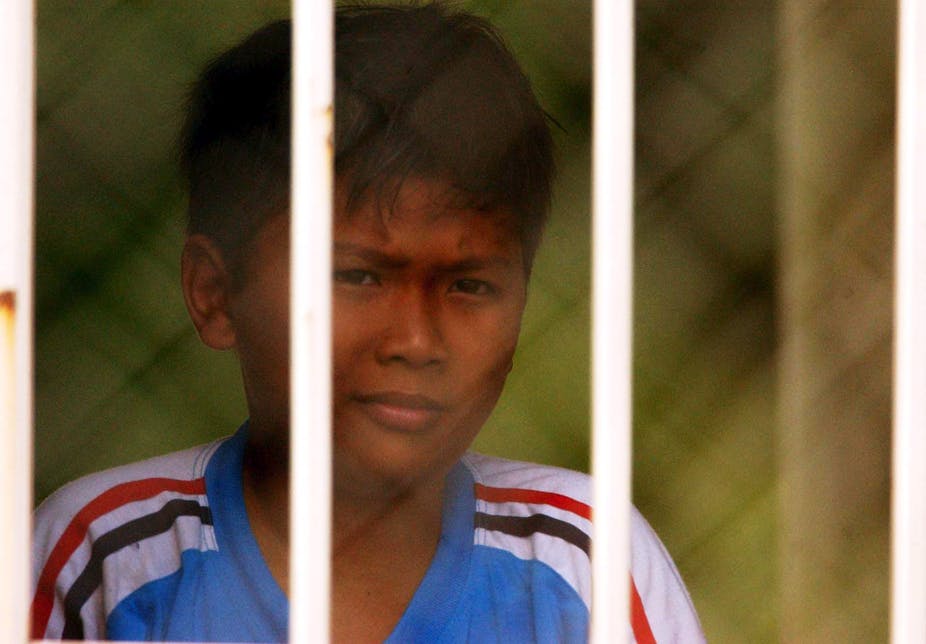The Senate Legal and Constitutional Affairs Committee tabled a report on the Migration Amendment (Detention Reform and Procedural Fairness) Bill 2010 in mid-August, hot on the heels of an announcement by the Commonwealth Ombudsman to investigate suicide and self-harm among detainees. But how much more can such reports tell us about the harm caused by detention?
That detention is harmful to children is now well established and widely understood. Detaining children and young people accentuates developmental risks, threatens bonds with parents and carers, limits educational opportunities, worsens the effects of existing trauma and results in impaired mental health.
These impacts were amply documented in the Human Rights and Equal Opportunity Commission Inquiry into Children in Immigration Detention (2004). It found alarming levels of suicidal ideation and acts of self-harm among young detainees, along with major depressive disorder and Post-Traumatic Stress Disorder.
Other mental health problems included anxiety, nightmares, bed-wetting, dissociative behaviour, emotional numbing and a sense of hopelessness. Evidence also suggested the kind of mental-health care required for these young people could not be effectively delivered in a detention setting.
What benefit?
But these findings are not limited to children: immigration detention has been shown to have an independent, adverse effect on the mental health of all detainees, both by exacerbating the impact of previous traumatic experiences and as a new source of ongoing trauma.
Helplessness, despair and panic are normal reactions to conditions of confinement and uncertainty that characterise detention. And riots, protests, self-harm and suicide are all predictable responses to the extraordinary stress it engenders.
A substantial body of social and clinical psychological research indicates the conditions imposed by detention are the most likely immediate contributors to the range of extreme adverse events consistently witnessed within detention facilities in Australia and internationally.
Many detainees have personal histories of exposure to torture or other potentially traumatic events, ongoing worry and guilt about families left behind, and the fear of being returned to a country where their life may be in danger.
No wonder “processing” compounds to progressively break asylum seekers down. And the harmful impact of detention on refugees persists well beyond the period of detention, with more recent studies documenting continuing distress and mental health problems between three and five years after release compared with refugees processed through community-based alternatives.

Australian model
Of particular concern is the way immigration detention is implemented under the Australian model – mandatory, indefinite detention and often in remote high-security facilities.
Remoteness restricts access to mental health and other services, as well as impeding links to community resources and networks. The ethical delivery of mental health services is also seriously compromised in such environments.
Concerns have also been raised about the impact of detention on the mental health and well-being of detention centre employees themselves. Staff are regularly in situations of extreme stress and often face threats to their personal safety but lack adequate training or experience to be able to respond.
Witnessing the hopelessness, despair, anger and self-harm of detainees is linked to secondary trauma. The grave risk to the mental health of detention centre personnel was demonstrated by the suicide of a detention centre officer in recent months.
Mental health training and support have been developed and delivered to some detention centre employees, but not across the board and some of the least-experienced frontline staff are missing out.
While current mitigating strategies such as providing mental health training to staff and releasing some children and families from detention are important to minimise harm, they fail to acknowledge that detention is, by its very nature, harm inducing and a source of trauma for all concerned.
The prevention of mental health problems and recovery from harms inflicted by detention cannot be fully addressed without widespread reform and a return to a less restrictive model for managing the majority of asylum seekers and other irregular migrants arriving in Australia.
It is absolutely clear from a health perspective that there’s no justification for indefinite, prolonged mandatory detention, particularly in offshore and remote locations.

Viable alternatives
There are effective humane alternatives to managing irregular migration. With effective systems in place, the vast majority of asylum seekers can reside in the community while their claims are being processed.
This optimises the health, well-being and eventual settlement outcomes of (those found to be) refugees as well as those who are eventually repatriated.
The United Nations High Commissioner for Refugees has highlighted the failure of detention to deter irregular migration, illustrating that community-based programs and supervised release result in low rates of absconding and have significantly better outcomes, both psychologically and in terms of cost.
While immigration detention remains, it’s essential that mental health services in detention settings (particularly remote, offshore centres) are improved and adequate support and training provided to all staff, including psychologists.
Adopting the amendments proposed by the Migration Amendment (Detention Reform and Procedural Fairness) Bill 2010 would bring Australian into line with our international human rights obligations.
The recent inquiry announced by the Commonwealth Ombudsman is welcome but the issues being addressed have been extensively examined in the past and there’s a real risk its recommendations won’t be implemented just as those emanating from other reports haven’t.
There’s overwhelming evidence to show that mandatory detention is extremely expensive, does not deter new arrivals, is not required for immigration compliance and is extraordinarily harmful to detainees and staff alike.
A humane alternative is long overdue.

